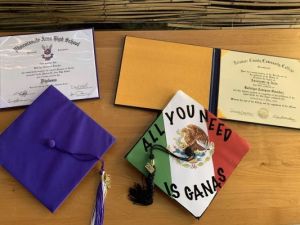Students are always taught to go to college after high school. If a student wants job stability, career satisfaction and full integration into society, that is. Growing up, I never knew that my immigrant status would affect my decision to continue my education after high school.

Photo by José Francisco Mazenett.
The specific immigrant status I hold is known as an “undocumented immigrant.” I do not agree with this label. I have multiple forms of legal documentation that identify me. Therefore, I am not undocumented. After high school and applying to many colleges and universities, I learned two things: continuing my education after high school will not be easy and schools and states will charge anything possible to make graduating more difficult for me.
After high school, I was accepted by many local colleges and universities. One of the first schools I was accepted by was Rosemont College. Here, I realized that many injustices ran through Rosemont’s pipelines. When I was accepted to Rosemont College, I let them know that I could not fill out Free Application For Student Aid forms because of my undocumented immigrant status.
Rosemont College was going to charge me an international tuition rate because I am not an American citizen. Thanks to Deferred Action for Childhood Arrivals, I could argue the fact that I am not an international student because I showed the school I have a social security card. After this experience, I did not go to Rosemont College.

According to the National Conference of State Legislatures, 38 states have approved in state tuition rates for undocumented students. Arizona, Georgia and Indiana do not allow in-state tuition rates for undocumented immigrant students. Alabama and South Carolina prohibit any undocumented immigrant student from enrolling in any public postsecondary institution. California, Colorado, Minnesota, New Mexico, Oregon, Texas and Washington, allow undocumented immigrant students to receive state financial aid.
Senior education major Grecia Mireles is against Georgia’s take on undocumented immigrant students who want to continue their education after high school. Mireles could not afford to go to college because she was going to be charged at an unfair tuition rate in comparison to her American citizen classmates.
Throughout her journey to find schools in Georgia, Mireles searched for online schools, affordable schools and schools that offered financial aid. No schools were applicable for her because she is an undocumented immigrant student. “I eventually moved to Kansas from Georgia because Kansas is school friendly to undocumented immigrant students and they charge me out of state tuition,” Mireles said.
Yeny Romero, an Alvernia University graduate and campaign member of Pennsylvania’s Tuition Equity and Inclusion Campaign further explained, “Often higher education institutions unknowingly discriminate against undocumented students by charging them unfair tuition rates even if their home has been in the United States for most of their lives.”
Many undocumented immigrant students can not even afford to go to school without the advantages that many American citizens receive such as Free Application For Student Aid, scholarships and student loans.
Yet, undocumented immigrant students have proven that it is very much possible to graduate from colleges and universities. I will be graduating from Cabrini University in December of 2021 with a degree in digital communication and social media. Also, with a Spanish minor.
Mireles will be graduating from Butler Community College in Andover, Kansas, in the fall of 2021.
I want undocumented immigrant students to know that it is very much possible to graduate from college. People will think we belong behind dishwashers and that is not true.
“All you need is ganas,” Jaime Escalante, calculus educator, said.

*definition of ganas, “need/want/dedication/will”


